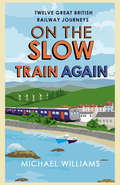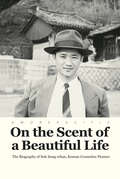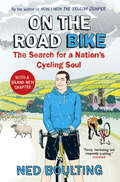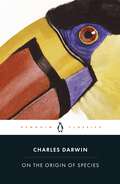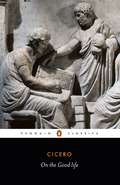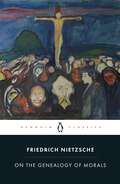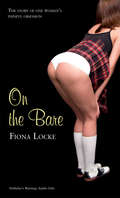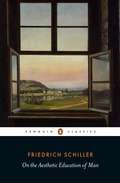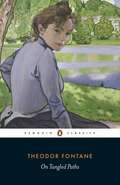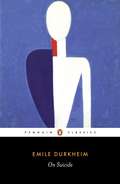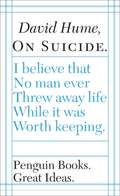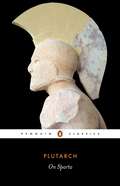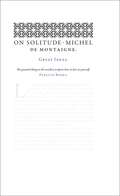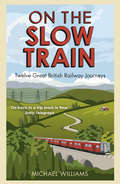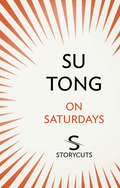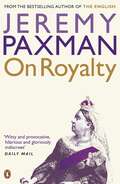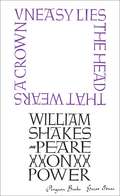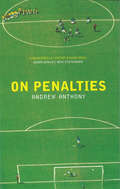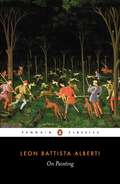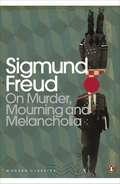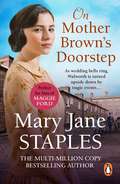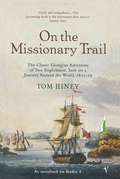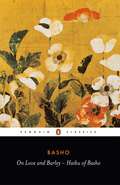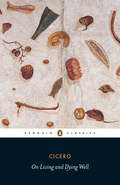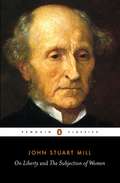- Table View
- List View
On the Slow Train Again
by Michael WilliamsMichael Williams has spent the past year travelling along the fascinating rail byways of Britain for this new collection of journeys. Here is the 'train to the end of the world' running for more than four splendid hours through lake, loch and moorland from Inverness to Wick, the most northerly town in Britain. He discovers a perfect country branch line in London's commuterland, and travels on one of the slowest services in the land along the shores of the lovely Dovey estuary to the far west of Wales. He takes the stopping train across the Pennines on a line with so few services that its glorious scenery is a secret known only to the regulars. Here, too, is the Bittern Line in Norfolk and the Tarka Line in North Devon as well as the little branch line to the fishing port of Looe in Cornwall, rescued from closure in the 1960s and now celebrating its 150th anniversary taking families on holiday to the seaside. From the most luxurious and historic - aboard the Orient Express - to the most futuristic - on the driverless trains of London's Docklands Light Railway - here is a unique travel companion celebrating the treasures of our railway heritage from one of Britain's most knowledgeable railway writers.
On the Scent of a Beautiful Life
by Han Mi-jaThis is the truly inspiring story of Suh Sung-whan, an entrepreneur who grew up in Gaeseong in North Korea, left school at the age of sixteen, and subsequently transformed a small family business into a multi-million dollar global cosmetics corporation, AmorePacific, famous for its perfumes and cosmetics across the world.When Suh Sung-whan was a young boy in the 1930s, his mother supported their family by mixing and selling hand-pressed hair treatment oils, created from camellia nut trees. Inspired by his mother, he quickly learned the skills for developing and selling these products, and earned himself a spot in the first department store to open in Gaeseong – a sign of the big things to come.Suh Sung-whan soon experienced a major setback however, when he was called up to fight with the Japanese during World War II. Following Korea’s liberation in 1945, he made a fully-fledged entry into business, expanding the company, now known as AmorePacific, both in Korea and worldwide. As well as developing a hugely successful cosmetics business, he also dedicated time to developing green tea farms in the Jeju and Honam regions, and launched OSulloc, his own tea company. This is the fascinating story of how a young boy took a small family business and developed it into a global company, which has been at the forefront of booming trade in Korea.
On the Road Bike: The Search For a Nation’s Cycling Soul
by Ned Boulting‘British cyclist. It used to be an oxymoron, a sort of silliness. Like French Cricket’ Ned Boulting has noticed something. It’s to do with bikes. They’re everywhere. And so are their riders. Some of these riders seem to be sporting sideburns and a few of them are winning things. Big things. Now Ned wants to know how on earth it came to this. And what, exactly is 'this'. In On the Road Bike, Ned Boulting asks how Britain became so obsessed with cycling. His journey takes him from the velodrome at Herne Hill to the Tour of Britain at Stoke-on-Trent via Bradley Wiggins, Chris Boardman, David Millar (and David’s mum), Ken Livingstone, both Tommy Godwins, Gary Kemp (yes, him from Spandau Ballet) and many, many more. The result is an amusing and personal exploration of the austere, nutty soul of British cycling.'Funny, fascinating and frequently touching ... will be enjoyed by anyone with even a passing interest in cycling. No bib shorts required' Guardian
On the Origin of Species
by Charles DarwinThis exciting anniversary edition has a new introduction and scholarly references by William Bynum, and the cover design is by Damien Hirst. It replaces our existing 1968 edition. The Origin of Species is one of the most important and influential books of its time and remains one of the most significant contributions to philosophical and scientific thought. The theories Darwin sets out here had an immediate and profound impact on the literature and philosophical thought of his contemporaries, and continue to provoke thought and debate today. Written for the general public of the 1850's, The Origin of Species laid out an evolutionary view of the world which challenged contemporary beliefs about divine providence and the fixity of species. He also set forth the results of his pioneering work on the interdependence of species: the ecology of animals and plants.
On the Good Life
by CiceroFor the great Roman orator and statesman Cicero, 'the good life' was at once a life of contentment and one of moral virtue - and the two were inescapably intertwined. This volume brings together a wide range of his reflections upon the importance of moral integrity in the search for happiness. In essays that are articulate, meditative and inspirational, Cicero presents his views upon the significance of friendship and duty to state and family, and outlines a clear system of practical ethics that is at once simple and universal. These works offer a timeless reflection upon the human condition, and a fascinating insight into the mind of one of the greatest thinkers of Ancient Rome.
On the Genealogy of Morals
by Friedrich NietzscheThe companion book to Beyond Good and Evil, the three essays included here offer vital insights into Nietzsche's theories of morality and human psychology.Nietzsche claimed that the purpose of The Genealogy of Morals was to call attention to his previous writings. But in fact the book does much more than that, elucidating and expanding on the cryptic aphorisms of Beyond Good and Evil and signalling a return to the essay form. In these three essays, Nietzsche considers the development of ideas of 'good' and 'evil'; explores notions of guilt and bad consience; and discusses ascetic ideals and the purpose of the philosopher. Together, they form a coherent and complex discussion of morality in a work that is more accessible than some of Nietzsche's previous writings.Friedrich Nietzsche was born near Leipzig in 1844. When he was only twenty-four he was appointed to the chair of classical philology at Basel University. From 1880, however, he divorced himself from everyday life and lived mainly abroad. Works published in the 1880s include The Gay Science, Thus Spoke Zarathustra, Beyond Good and Evil, On the Genealogy of Morals, Twilight of the Idols and The Antichrist. In January 1889, Nietzsche collapsed on a street in Turin and was subsequently institutionalized, spending the rest of his life in a condition of mental and physical paralysis. Works published after his death in 1900 include Will to Power, based on his notebooks, and Ecce Homo, his autobiography.Michael A. Scarpitti is an independent scholar of philosophy whose principal interests include English and German thought of the eighteenth and nineteenth centuries, as well as exegesis and translation theory.Robert C. Holub is currently Ohio Eminent Scholar and Professor of German at the Ohio State University. Among his published works are monographs on Heinrich Heine, German realism, Friedrich Nietzsche, literary and aesthetic theory, and Jürgen Habermas.
On the Bare
by Fiona LockeFiona Locke's Over the Knee has become a cult classic, and is considered a definitive work of corporal punishment and fetish fiction in the UK and US. Its reputation spread from online message boards and was helped by a saucy picture of Fiona on the cover 'in action'. Her new title will be even stronger - an anthology of short fiction exploring and updating old-school spanking scenarios. The bratty, the spoilt, and the wilful all get their stinging just-deserts from masterly purveyors of discipline. With twelve new stories all including the requisite detail her spanko fans adore, On the Bare promises to be another surefire hit and modern cult classic.
On the Aesthetic Education of Man
by Friedrich Schiller'The artist is certainly the child of his age, but all the worse for him if he is at the same time its pupil, even worse its minion.'On the Aesthetic Education of Man is one of the most profound works of German philosophy, in which Friedrich Schiller analyses politics, revolution and the history of ideas to define the relationship between beauty and art. Resulting from Schiller's deep disillusionment with the course of the French Revolution and expressed as a series of letters to a patron, On the Aesthetic Education of Man is an impassioned attempt to drag mankind upwards from failure to greatness through placing ideas of aesthetic education at the heart of the human experience: 'Our era has actually taken both wrong turnings, and has fallen prey to coarseness on the one path, lethargy and perversity on the other. Having strayed along both paths, it is beauty that can lead [us] back.' Schiller's arguments are as arresting, challenging and inspiring today as when they were first written - it is above all one of the great political statements from a time of revolutionary change.
On Tangled Paths
by Theodor FontaneA moving love story and a vivid depiction of Berlin in the 1870s, from Germany's greatest nineteenth-century novelist Theodor Fontane.Lene is a beautiful, orphaned young seamstress, and Botho is a handsome, aristocratic cavalry officer. They are in love, yet know they have only a short time together as society deems their relationship impossible and refuses to acknowledge the seriousness of their feelings. But while Botho appears to have a glittering life ahead of him, the love he feels may yet be his undoing. Published in 1887, On Tangled Paths caused a scandal on publication with its portrayal of a sexual affair across the classes, and is a taut, flawless masterpiece.Theodor Fontane was born in the Prussian province of Brandenburg in 1819. After qualifying as a pharmacist, he made his living as a writer. From 1855 to 1859, he lived in London and worked as a freelance journalist and press agent for the Prussian embassy. While working as a war correspondent during the Franco-Prussian war of 1870-1 he was taken prisoner, but released after two months. His first novel, Before the Storm, was published when he was fifty-eight and was followed by sixteen further novels, of which Effi Briest, No Way Back and On Tangled Paths are all published in Penguin Classics. He died in 1898.Peter James Bowman completed a PhD on Fontane at Cambridge University, and now works as a writer and translator. 'On Tangled Paths has the flawless logic and beautiful design of the novella at its best' - Paul Binding, The Spectator'There is an undertow of sadness to this novel, yet to read it is a joy, for its humanity, subtlety and visual immediacy' - Ruth Pavey, The Independent'Theodor Fontane's first true masterpiece; it has a perfect beginning, a perfect ending, and no superfluous sentence in between' - Henry Garland
On Suicide
by Emile DurkheimEmile Durkheim's On Suicide (1897) was a groundbreaking book in the field of sociology. Traditionally, suicide was thought to be a matter of purely individual despair but Durkheim recognized that the phenomenon had a social dimension. He believed that if anything can explain how individuals relate to society, then it is suicide: Why does it happen? What goes wrong? Why do certain social, religious or racial groups have higher incidences of suicide than others? As Durkheim explored these questions he became convinced that abnormally high or low levels of social integration lead to an increased likelihood of suicide. On Suicide was the result of his extensive research. Divided into three parts - individual reasons for suicide, social forms of suicide and the relation of suicide to society as a whole - Durkheim's revelations have fascinated, challenged and informed readers for over a century.
On Suicide (Penguin Great Ideas)
by David HumeOne of the most important thinkers ever to write in English, the Empiricist David Hume liberated philosophy from the superstitious constraints of religion; here, he argues that all are free to choose between life and death, considers the nature of personal taste and succinctly criticises common philosophies of the time.
On Sparta
by PlutarchPlutarch's vivid and engaging portraits of the Spartans and their customs are a major source of our knowledge about the rise and fall of this remarkable Greek city-state between the sixth and third centuries BC. Through his Lives of Sparta's leaders and his recording of memorable Spartan Sayings he depicts a people who lived frugally and mastered their emotions in all aspects of life, who also disposed of unhealthy babies in a deep chasm, introduced a gruelling regime of military training for boys, and treated their serfs brutally. Rich in anecdote and detail, Plutarch's writing brings to life the personalities and achievements of Sparta with unparalleled flair and humanity.
On Solitude (Penguin Great Ideas)
by Michel de MontaigneBlending intellectual speculation with anecdote and personal reflection, the Renaissance thinker and writer Montaigne pioneered the modern essay. This selection contains his idiosyncratic and timeless writings on subjects as varied as the virtues of solitude, the power of the imagination, the pleasures of reading, the importance of sleep and why we sometimes laugh and cry at the same things. Throughout history, some books have changed the world. They have transformed the way we see ourselves - and each other. They have inspired debate, dissent, war and revolution. They have enlightened, outraged, provoked and comforted. They have enriched lives - and destroyed them. Now Penguin brings you the works of the great thinkers, pioneers, radicals and visionaries whose ideas shook civilization and helped make us who we are.
On The Slow Train: Twelve Great British Railway Journeys
by Michael Williams'A trip back in time' DAILY TELEGRAPHA love of railways, a love of history, a love of nostalgia.______________________________Get ready to board the slow train to another era, to a time when travel meant more than hurrying from one place to the next. On the Slow Train will reconnect you with that long-missed need for escape, and reminds us to lift our heads from the daily grind and remember that there are still places in Britain where we can take the time to stop and stare. This book is a paean to another age: before milk churns, train porters and cats on seats were replaced by security announcements and Burger King wrappers. These 12 spectacular journeys will help free us from what Baudelaire denounced as 'the horrible burden of time.'___________________________________'Captivating' SUNDAY EXPRESS'Deep in our soul, the railways represent an idyll that we love' INDEPENDENT'A magical world, barely changed since the golden age of rail' DAILY MAIL'Superb' RAILYWAY MAGAZINE'Memory lane . . . An intriguing social snapshot' HERITAGE RAILWAY
On Saturdays (Storycuts)
by Su TongYou don't expect some guy making small talk on a train to turn into a real friend, but that was just the kind of friend Papa Qi was. And afterwards, Saturday became Papa Qi's visiting day. Every Saturday.Part of the Storycuts series, this short story was previously published in the collection Madwoman on the Bridge.`
On Royalty: A Very Polite Inquiry Into Some Strangely Related Families
by Jeremy PaxmanWhat is the point of Kings and Queens? What do they do all day? And what does it mean to be one of them? Jeremy Paxman is used to making politicians explain themselves – but royalty has always been off limits. Until now. In On Royalty he delves deep into the past and takes a long hard look at our present incumbents to find out just what makes them tick. Along the way he discovers some fascinating and little-known details. Such as: • how Albania came to advertise in England for a king• which English queen gave birth in front of 67 people• how easy it is to beat up future kings of England • and how meeting the Queen is a bit scary – whoever you are …No other book will tell you quite as much about our kings, queens, princes and princesses: who they are and what they’re for.
On Power
by William ShakespeareThese are Shakespeare's greatest writings on power in all its forms - in love, in war, in politics and in the family. From Macbeth's vaulting ambition to Richard II's fragile grip on authority, from the violent rivalries of King Lear to the exquisite poetry of the love sonnets, these pieces show, with philosophical subtlety and psychological acuity, how we manipulate and dominate each other.Throughout history, some books have changed the world. They have transformed the way we see ourselves - and each other. They have inspired debate, dissent, war and revolution. They have enlightened, outraged, provoked and comforted. They have enriched lives - and destroyed them. Now Penguin brings you the works of the great thinkers, pioneers, radicals and visionaries whose ideas shook civilization and helped make us who we are.
On Penalties
by Andrew Anthony'Score and few will remember; miss and no one will forget'Talking to some of the game's most successful players and managers, the question the book seeks to address is simple: can England overcome their fear of the penalty?The penalty shoot-out is the greatest set piece of sporting drama ever conceived. Cruel, arbitrary, tortuous and unfair, it has also presented the England football team with a new and infinitely more punishing manner in which to lose. Three times in the past decade the nation has sat on the edge of its collective sofa and watched the seemingly inevitable unfold as Stuart Pearce, Chris Waddle, Gareth Southgate, Paul Ince and David Batty have selected the wrong shots in the lottery of international championship shoot-outs. Except it's not a lottery. There is an art to scoring penalties, which calls upon a unique combination of physical prowess and psychological strength. In the corridor of truth that leads from the penalty spot to the goal-line, a succession of English footballers have had to confront not only the opposing goalkeeper but the hopes and dreams of fans and fellow countrymen and, of course, themselves. 'A tour de force of narrative journalism' Observer
On Painting
by Leon AlbertiArtist, architect, poet and philosopher, Leon Battista Alberti revolutionized the history of art with his theories of perspective in On Painting (1435). Inspired by the order and beauty inherent in nature, his groundbreaking work sets out the principles of distance, dimension and proportion; instructs the painter on how to use the rules of composition, representation, light and colour to create work that is graceful and pleasing to the eye; and stipulates the moral and artistic pre-requisites of the successful painter. On Painting had an immediate and profound influence on Italian Renaissance artists including Ghiberti, Fra Angelico and Veneziano and on later figures such as Leonardo da Vinci, and remains a compelling theory of art.
On Murder, Mourning and Melancholia (Penguin Modern Classics)
by Sigmund FreudThese works were written against a background of war and racism. Freud sought the sources of conflict in the deepest memories of humankind, finding clear continuities between our 'primitive' past and 'civilized' modernity. In Totem and Taboo he explores institutions of tribal life, tracing analogies between the rites of hunter-gatherers and the obsessions of urban-dwellers, while Mourning and Melancholia sees a similarly self-destructive savagery underlying individual life in the modern age, which issues at times in self-harm and suicide. And Freud's extraordinary letter to Einstein, Why War? - rejecting what he saw as the physicist's naïve pacifism - sums up his unsparing view of history in a few profoundly pessimistic, yet grimly persuasive pages.
On Mother Brown's Doorstep: (The Adams Family: 4): A wonderfully heart-warming and funny Cockney saga you won’t want to end (The Adams Family #4)
by Mary Jane StaplesBy Sunday Times bestseller Mary Jane Staples, this is the gritty and uplifting next instalment in the Adams Family saga. Perfect for fans of Maggie Ford and Kitty Neale and Donna Douglas.PRAISE FOR THE ADAMS FAMILY SERIES! "Mary Jane Staples makes you care about her characters, which explains why her books have enjoyed so much popularity" -- Take a Break"Forget Eastenders, this it the London of old, when people knew each other's names and communities really pulled together." -- Woman's Realm"Mary Jane Staples completely capture the feel of the period and the essence of the people...has warmth, humour and charm. An ideal book for you holiday reading." Finesse "I get so engrossed in the stories I feel like one of the family." - ***** Reader review. "These books about the Adam's family are fantastic! These books are the kind you can read, leave a while and read again & again!" - ***** Reader review*********************************AS WEDDING BELLS RING, WALWORTH IS TURNED UPSIDE DOWN BY TRAGIC EVENTS ...Susie Brown is overjoyed when her brother, Will, turns up unexpectedly on leave from service in time for her wedding to Sammy Adams.But Will's leave is an extended one due to bad health and he's unsure whether the army will keep him or whether he'll be able to find a job in the slump of the Twenties. To make matters worse, he's at risk of falling in love with the young and personable Annie Ford ...Amidst the joyous wedding preparations, a cloud hangs over Walworth - the mystery of three young girls missing from their homes. A mystery that will culminate - along with Will's personal problems - on the night of the wedding.On Mother Brown's Doorstep is the fourth in Mary Jane Staples's Adams Family series. Their story continues in A Family Affair. Have you read Down Lambeth Way, Our Emily and King of Camberwell - the first three Adams Family novels ?
On The Missionary Trail
by Tom HineyThis is the strange and wondrous story of an eight-year voyage and a mission to save souls. Their mission started in the South Seas, where they reported scenes of chiefs surfing, perpetual warfare and a sudden surge of Christianity. From there they went via New Zealand, Australia and its aboriginal hinterland, through 'the Orient' to India and slave-ridden Mauritius. Based on contemporary journals, mission reports, letters and illustrations, and bursting with character and anecdote. ON THE MISSIONARY TRAIL is both the enthralling narrative of the longest missionary voyage ever undertaken and a colourful, detailed, eye-opening snapshot of little-known worlds, set against the wider picture of evangelism and guilt, heroism and humanity.
On Love and Barley: Haiku of Basho
by Matsuo BashoBasho, one of the greatest of Japanese poets and the master of haiku, was also a Buddhist monk and a life-long traveller. His poems combine 'karumi', or lightness of touch, with the Zen ideal of oneness with creation. Each poem evokes the natural world - the cherry blossom, the leaping frog, the summer moon or the winter snow - suggesting the smallness of human life in comparison to the vastness and drama of nature. Basho himself enjoyed solitude and a life free from possessions, and his haiku are the work of an observant eye and a meditative mind, uncluttered by materialism and alive to the beauty of the world around him.
On Living and Dying Well
by CiceroIn the first century BC, Marcus Tullius Cicero, orator, statesman, and defender of republican values, created these philosophical treatises on such diverse topics as friendship, religion, death, fate and scientific inquiry. A pragmatist at heart, Cicero's philosophies were frequently personal and ethical, drawn not from abstract reasoning but through careful observation of the world. The resulting works remind us of the importance of social ties, the questions of free will, and the justification of any creative endeavour.This lively, lucid new translation from Thomas Habinek, editor of Classical Antiquity and the Classics and Contemporary Thought book series, makes Cicero's influential ideas accessible to every reader.
On Liberty and the Subjection of Women
by John Stuart MillA prodigiously brilliant thinker who sharply challenged the beliefs of his age, the political and social radical John Stuart Mill was the most influential English-speaking philosopher of the nineteenth century. Regarded as one of the sacred texts of liberalism, his great work On Liberty argues lucidly that any democracy risks becoming a 'tyranny of opinion' in which minority views are suppressed if they do not conform with those of the majority. Written in the same period as On Liberty, shortly after the death of Mill's beloved wife and fellow-thinker Harriet, The Subjection of Women stresses the importance of equality for the sexes. Together, the works provide a fascinating testimony to the hopes and anxieties of mid-Victorian England, and offer a compelling consideration of what it truly means to be free.
